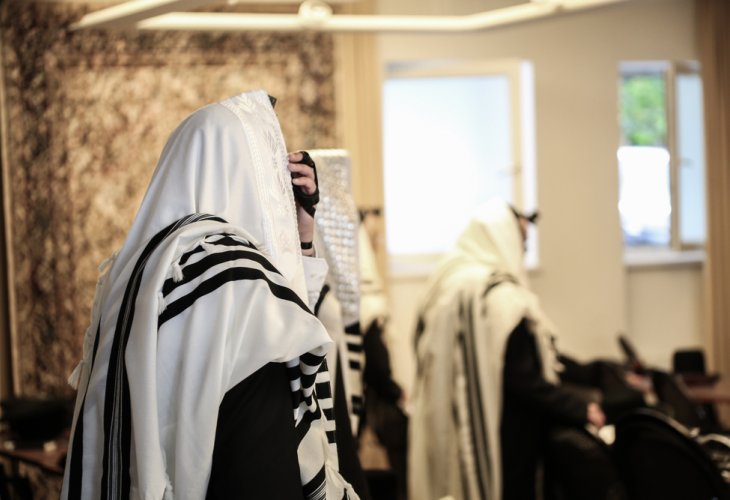Beginners Guide
The Morning Blessings: A Jewish Path to Daily Mindfulness
15 ancient prayers that transform routine into spiritual awareness
 (Illustration photo: shutterstock)
(Illustration photo: shutterstock)Each new morning is a fresh start. In Jewish tradition, we begin our day with mindful appreciation for the daily miracles we often overlook. Known as Birkot HaShachar, the Morning Blessings, this series of 15 short prayers guides us to recognize the Divine gifts that make life possible. Though recited in the context of morning prayers (Shacharit), these blessings are deeply personal, grounded in gratitude, and relevant to everyone, every day.
15 Morning Blessings that Stir the Soul
Each blessing begins with the same opening formula:
Baruch Atah Hashem Elokeinu Melech Ha’olam ("Blessed are You, Hashem, our God, King of the universe…")
Let’s explore each one, with both transliteration and English translation:
…Asher natan lasechvi vinah l’havchin bein yom u’vein lailah
“…Who has given the rooster (or the heart) understanding to distinguish between day and night.”
This blessing thanks Hashem for the human ability to discern and reason and function as an internal compass guiding our day.…Shelo asani goy
“…Who has not made me a non-Jew.”
A prayer of gratitude for being part of the Jewish people, who have been entrusted with mitzvot (Divine commandments).…Shelo asani eved
“…Who has not made me a slave.”
Freedom is a sacred gift, and this blessing acknowledges our ability to make spiritual and moral choices.…Shelo asani isha(for men), “…Who has not made me a woman”
Baruch… she’asani kirtzono(for women)...“Blessed… Who has made me according to His will.”
These reflect the different roles and responsibilities given to men and women in Jewish tradition and highlight that each has their own spiritual path.…Pokeach ivrim
“…Who opens the eyes of the blind.”
The gift of sight should not be taken for granted.…Malbish arumim
“…Who clothes the naked.”
We express thanks for our clothing and dignity.…Zokef kefufim
“…Who straightens the bent.”
After a night of sleep, we stand upright again, a physical and symbolic fresh start.…Matir asurim
“…Who releases the bound.”
A prayer of appreciation for mobility and the body's release from stillness.…Roka ha’aretz al hamayim
“…Who spreads the earth upon the waters.”
We acknowledge the stability beneath our feet, quite literally.…She’asah li kol tzorki
“…Who has provided me with all my needs.”
Often understood as gratitude for shoes, this blessing expands to include all daily essentials.…Hameichin mitzadei gaver
“…Who prepares the steps of man.”
A recognition of the body’s coordination and Divine guidance in our journey.…Ozer Yisrael bigvurah
“…Who girds Israel with strength.”
The physical and spiritual strength to resist temptation and live with purpose.…Oter Yisrael b’tifarah
“…Who crowns Israel with glory.”
An expression of the honor of wearing a head covering or tallit (prayer shawl), both symbols of holiness.…Hanotein l’ya’eif koach
“…Who gives strength to the weary.”
A deep thank you for renewed energy and inner peace after sleep.…Hama’avir sheina mei’einai u’tnumah mei’afapai…
“…Who removes sleep from my eyes and slumber from my eyelids…”
This final blessing includes a heartfelt personal prayer, asking for guidance, protection, good friends, and spiritual growth throughout the day.
A Daily Opportunity to Feel Blessed
Birkot HaShachar are more than just words. They’re a moment of mindfulness and gratitude that can change the tone of your entire day. Whether you're deeply observant or just beginning to explore Jewish spirituality, these blessings invite you to pause and reflect on the countless gifts you receive every morning.
Rabbi Chanan Cholak, founder of the Israeli nonprofit Ezer Mizion, once shared a powerful story: When the Rosh Yeshiva of Ponovitch, Rav Shach was an older man, Rabbi Cholak was one of the people who helped care for him. When they reached the blessing of "opens the eyes of the blind," Rav Shach told him to yell the blessing. "I am no longer able to see with my eyes," Rav Shach explained. Similarly, a man in a wheelchair begged him to shout the blessing "prepares the steps of man" and explained that he was no longer able to walk.
These blessings are deeply real. They remind us that the things we often take for granted, like sight, movement, freedom, thought, and even the ground beneath us, should not be overlooked. Saying Birkot HaShachar each morning helps us begin the day not only awake, but truly alive.

